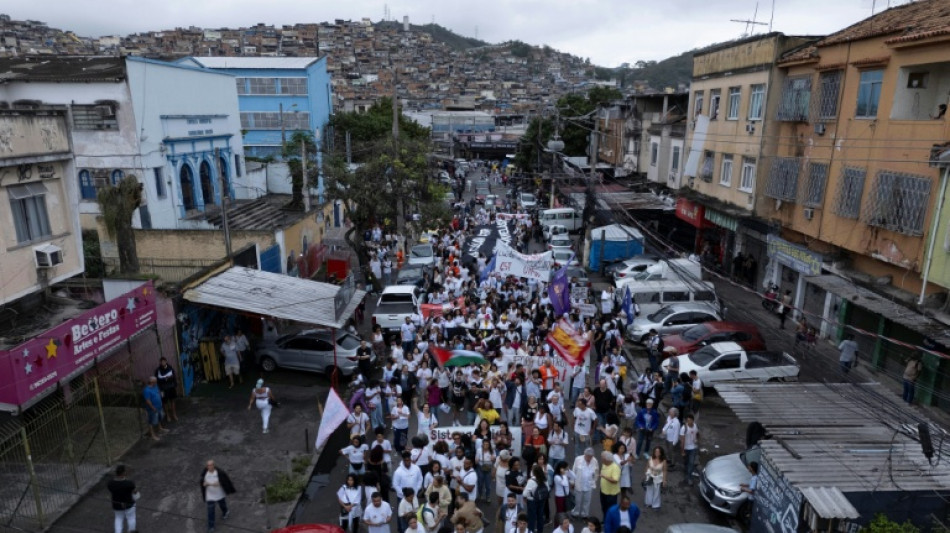

After the tears, anger on Rio's blood-stained streets
In a Rio de Janeiro favela, a little boy wore a T-shirt stained with red paint mimicking the blood spilled this week in Brazil's deadliest-ever police operation.
He held up a sign reading: "Children should be able to play, the favela wants to live in peace."
The boy was one of hundreds of people who marched Friday through the streets of Vila Cruzeiro, one of the Rio favelas where the raids claimed over 120 lives in an hours-long crackdown just three days earlier.
Favelas are low-income and crowded neighborhoods that are often built on steep hillsides in Brazil.
"Tuesday was the day of horror. What we saw here was a massacre," said Ana Maria Pereira, 18, a resident of the neighborhood that is home mainly to Black and mixed-race people, and whose narrow alleys are overhung by tangles of electric wires.
Friday's demonstration set out from the football field in Rio where Adriano, former star of Inter Milan and Brazil's national team, had kicked his first balls as a youngster.
"Out with Castro, stop the massacres!" the protesters chanted, referring to Rio state's rightwing Governor Claudio Castro, who deemed the deadly operation a "success" against "narcoterrorists."
"120 lives lost is not a success," read one sign. "Castro has blood on his hands," said another.
Dozens of motorcycle taxis, a common form of transport through the shantytown's steep, winding streets, also joined the procession with engines roaring.
"On the day of the operation, the police prevented us from moving, they shot at us and threw tear gas," moto-taxi driver Lucas Azevedo, 32, told AFP.
Residents from other, more upscale neighborhoods also joined the march, including Miguel Rabelo, a 30-year-old musician.
"It's important for me to come here, listen to people, share this moment with them, look them in the eyes," he said.
- 'Pain, indignation' -
The police raid, said to have targeted Rio's Comando Vermelho (Red Command) drug gang, has drawn condemnation from human rights organizations. The United Nations has called for an investigation.
Relatives of some of the victims denounced summary executions. An AFP journalist on the scene saw a decapitated body.
"There is a lot of pain, indignation, but we are gathered here to ensure that this never happens again," said Monica Benicio, widow of Marielle Franco, a Rio city councilor assassinated in 2018 in a crime that shocked Brazil and the world.
"The most terrifying thing is to see that part of society applauds, saying that the only good criminal is a dead criminal," lamented the 39-year-old, herself now a city councilor.
Despite widespread outrage, opinion polls in recent days found a majority of Brazilians approve of the bloody operation.
"A national mobilization is needed to combat this organization, which is no longer just a criminal organization but a terrorist organization...employing guerrilla tactics and oppressing community residents," Felipe Curi, the head of Rio's Civil Police force told reporters Friday.
He said police had so far identified the bodies of 99 "criminals" among the dead -- 42 of them subject to arrest warrants and 78 with extensive criminal records.
Amid criticism that his administration is too lenient on crime, leftist President Luiz Inacio Lula da Silva said on X Friday he had submitted a bill to parliament proposing a minimum 30-year prison sentence for gang members.
O.Meyer--JdB



